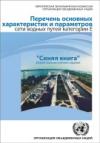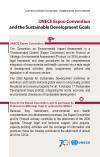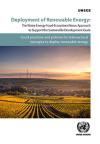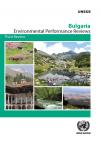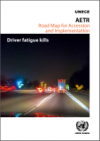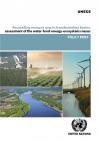Publications
Displaying Results 801 - 820 of 2807
- Pусский
Цель «Синей книги» - предоставить перечень существующих и планируемых характеристик и параметров водных путей и портов категории E в Европе и показать, на международно-сопоставимой основе, нынешние параметры инфраструктуры внутренних водных путей по сравнению с минимальными характеристиками и параметрами, предписанными в Европейском соглашении о важнейших внутренних водныхпутях международного
- Français
Le Livre bleu dresse un inventaire des normes et paramètres actuels et envisagés des voies navigables et ports E en Europe, régulièrement mis à jour par la Division des transports de la CEE-ONU, et présente, sur une base internationale comparable, les paramètres d'infrastructure actuels de la navigation intérieure en Europe par rapport à ceux des normes et paramètres minimaux prescrits dans l'
- English
The brochure has been prepared by the Inter-Agency Coordination Group for Industrial and Chemical Accidents. The Inter-Agency Coordination Group is an informal forum that brings together international organizations and institutions working on the prevention of, preparedness for and response to
- English
UNECE Espoo Convention and Sustainable Development Goals The SDG postcard is available in English. Prepared by the UNECE secretariat, the postcard presents selected examples of how the Convention and in particular, its Protocol can work towards Sustainable Development Goal targets.
- English
By providing an intergovernmental science and policy platform for reducing air pollution and its impacts, including climate change, the Air Convention contributes to the attainment of 11 of the SDGs.EN
- English
The water-energy-food-ecosystems nexus approach comes in with the objective of promoting coordination and integrated planning and sustainable management of interlinked resources across sectors, which could speed up the achievement of the 2030 Agenda for Sustainable Development. The nexus could leverage deployment of renewable energy across the Goals. The meaning of “nexus”, in the context of
- English
The present publication contains the third Environmental Performance Review of Bulgaria. It takes stock of progress made by the country in the management of its environment since 2007. The publication covers issues of specific importance to the country related to legal and policy frameworks, the financing of environmental expenditures, greening the economy, air protection, water and waste
- English
UNECE Countries in Figures presents a profile of social and economic indicators for each of the 56 UNECE member countries.These profiles, prepared by the UNECE Statistical Division, are intended to be of interest to readers not necessarily familiar with statistical terminology or with interpreting statistical tables. A glossary of terms and list of references is available at the back of the
- English
Convention on the Transboundary Effects of Industrial Accidents - as amended on 15 December 2015Full Text
- English
European Agreement concerning the Work of Crews of Vehicles Engaged in International Road Transport (AETR)Road Map for Accession and ImplementationErratum: on page 25, the Russian Federation is erroneously listed as one of the countries applying the AETR Agreement domestically. The authors regret this error.
- English
- Pусский
The study presents the results of the SEMAFOR (System for the Evaluation of the MAnagement of FORests) pilot study, which tested the method through voluntary assessment of the sustainability of forest management in European countries, on the basis of the Pan-European set of criteria and indicators. Scale-neutral indicators were developed and used to describe and assess the situation in
- English
The study presents the results of the SEMAFOR (System for the Evaluation of the MAnagement of FORests) pilot study, which tested the method through voluntary assessment of the sustainability of forest management in European countries, on the basis of the Pan-European set of criteria and indicators. Scale-neutral indicators were developed and used to describe and assess the situation in
- English
This policy brief provides an introduction towards the different stages of and benefits from an assessment of the water-food-energy-ecosystems nexus, with a specific focus on resource use in transboundary basins. It summarizes the experience from the first three transboundary basins where a methodology for participatory assessment of intersectoral linkages, trade-offs and benefits in
- English
This Country Profile (CP) of the Republic of Armenia is the nineteenth in the series and the second review done for the country. The first was prepared in 2004 and the analyses covered only the housing sector. This CP is an in-depth analyses of the housing, urban development and land management sectors of the Republic of Armenia. It provides policy recommendations on these sectors, while
- English
The brochure on International Driving Permit Categories recommends reconciliations of the differences between the International Driving Permit categories in the 1968 Convention on Road Traffic and the corresponding definition for the same symbol in the EU Driving Licence Directive (2006/126/EC of 20
- English
Public-Private Partnerships (PPPs) is a possible solution for financing and implementing public projects. These projects allow the public sector to benefit from private sector funding, expertise and capacity while allowing the private sector to partner with the public sector in providing critical public services. There are a number of areas within Trade Facilitation
- English
Industrial accidents can happen anywhere, anytime. Often, they have severe consequences on human health and the environment, including in other affected countries. The UNECE Industrial Accidents Convention helps its Parties to prevent industrial accidents, especially those with transboundary effects, and to prepare for and respond to such accidents if they occur. This brochure explains why
- English
This policy brief synthesizes the main findings and recommendations from the nexus assessment of the Sava River Basin shared by Bosnia and Herzegovina, Croatia, Montenegro, Serbia and Slovenia which was carried out from 2014 to 2016 in the framework of the UNECE Water Convention’s Programme of Work.
The assessment aimed to foster transboundary cooperation by identifying intersectoral
- English
Coordination between the water, energy, food and environment sectors is fraught with difficulties at the national level and the complexity increases substantially in transboundary basins. The “nexus approach” to managing interlinked resources has emerged as a way to enhance water, energy and food security by increasing efficiency, reducing trade-offs, building synergies and improving governance,


